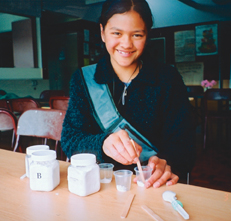![]() DEVELOPING
CHILDREN'S SCIENCE INVESTIGATION SKILLS
DEVELOPING
CHILDREN'S SCIENCE INVESTIGATION SKILLS
![]()
Rosemary
Hipkins and Natasha Kenneally
This
research builds on an earlier NEMP probe study that found many
teachers seem not to actively teach students the investigative
skills called for in the ‘Developing Scientific Skills and
Attitudes’ strand of the New Zealand Science Curriculum.
|
Descriptions
of children’s investigative actions obtained from 200 videotaped
episodes of Year 4 or Year 8 groups of children carrying out three NEMP
science investigation tasks (‘Truck Track’, ‘Ball Bounce’,
and ‘Emptying Rate’) were analysed in the light of research
literature describing children’s actual and potential investigative
skills development.
| •
Children can recognise ‘fair tests’ before they are able
to produce these independently. When children are asked to undertake
pre-devised ‘investigations’, this recognition may take
the form of intuitive actions, carried out silently with no discussion
during any stage of the investigation. • When presented with a prescribed task, children may perceive little meaning beyond task completion in the actions they carry out. Unless the context is familiar, children may struggle to recognise variables that need to be controlled, or to develop a considered causal theory that gives a sense of science meaning to their investigation. • Year 8 children recognise and acknowledge more features of fair tests than do Year 4 children. They are more likely to control at least some variables, although they do not usually display any other types of development in their approach to/understanding of fair testing. • Children find measuring laborious, and the context of a task can greatly influence the measuring skills demanded of them (e.g., unfamiliar measuring tools distract from the main focus). |
•
The act of measuring followed by written recording seems to partition
sequential tests into distinct episodes so that they are not immediately
seen as parts of a whole, coherent test design. Even when they have
planned a series of tests, children may deviate from their intended
plan part way through. Children’s more limited memory capacity
perhaps exacerbates this effect. |
![]()
| Primary
teachers can use relatively simple measures to help children actively
learn the skills of investigating ‘scientifically’: • Rich opportunities that allow children to recognise fair tests before they are required to produce these via independent planning. Strategies to support such approaches are straightforward, although some require specialist materials to be developed. • Rich exploratory experiences from which children can build a library of causal mechanisms that they can draw on to shape their own investigative questions and/or explanations of the phenomena they explore. |
•
Visual strategies that bring more of the overall investigation structure
and/or results into view simultaneously, helping to transcend memory
demands. Such strategies support children’s ability to identify
fair tests and/or to see meaningful data patterns from single repeated
tests, or from sequences of tests. • Simplifying measuring may free children to pay more attention to the overall patterns and purposes of their tests. Collection of category rather than continuous data is one such strategy. • Encouraging children to explore patterns of data variability may make the process of test repetition more meaningful for them. |
or will be available from USEE.
